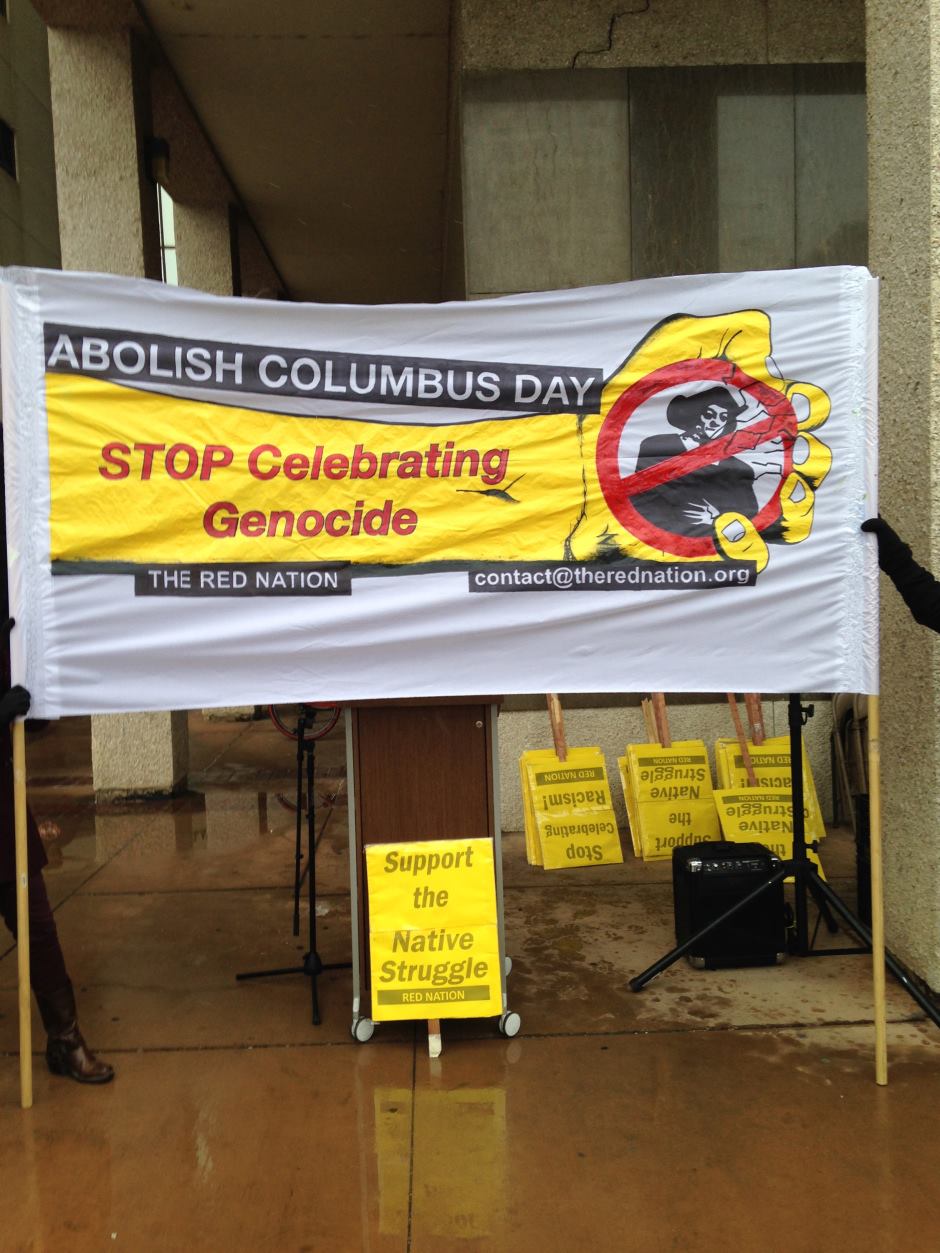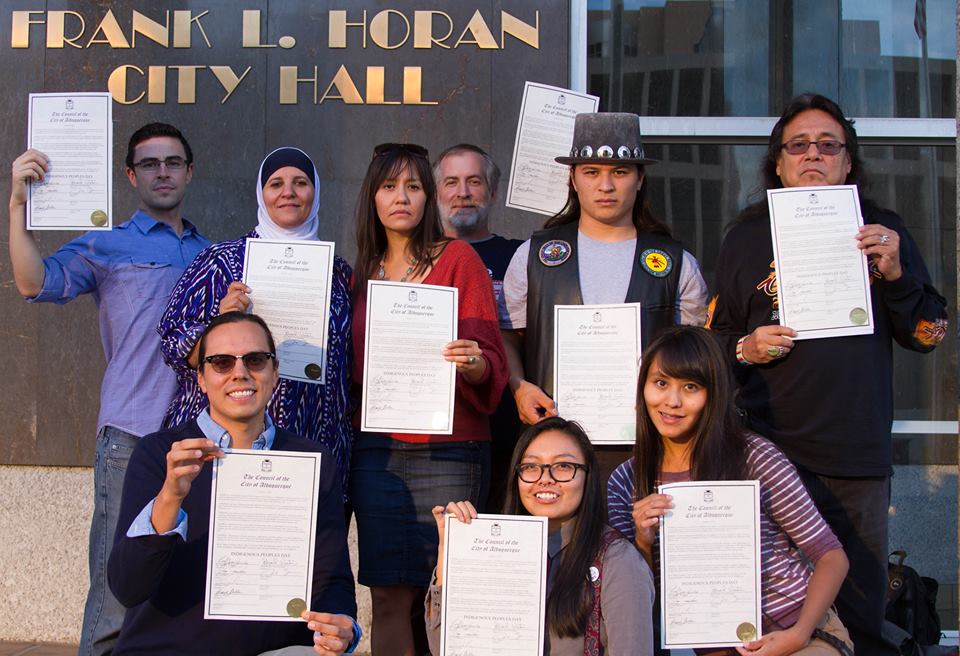Truth-Telling in American History: Groups Fight for Indigenous Peoples Day

From the Northern Plains to the Southwestern deserts, American Indian groups are working to correct historic falsehoods and demanding acknowledgement of what the “discovery” of this continent meant to and for Indigenous Peoples.
One focus of this effort is to convince municipalities to pass resolutions changing the name of the holiday celebrated on the second Monday of October from Columbus Day to Indigenous Peoples Day. In 1992, the city of Berkeley, California, became the first to abolish Columbus Day, and several other California cities have followed suit. As have a number of other cities, including Seattle, Washington; St. Paul, Minneapolis; Grand Rapids and Duluth, Minnesota; and Traverse City, Michigan.
For many groups, convincing city council members to make the change has been a struggle, in large part because it requires that leaders be open to dealing with aspects of history that do not reflect the American myth every school child learns, a myth that dismisses or simply ignores the devastation colonialism inflicted on the continent’s original inhabitants.
RELATED: New AP US History Exam Perpetuates Lies About Native Americans
“There is a reluctance on the part of some people to accept the truth about Columbus and the Doctrine of Discovery and the brutal acts that he committed,” says Maylynn Warne, Pawnee/Santa Ana Pueblo, a member of the Fargo [N.D.] Native American Commission. The commission has had to make difficult compromises to write a resolution that the city council might find acceptable.
Clinton Alexander, an enrolled member of the White Earth Ojibwe Nation, is chair of the Fargo commission. “We looked at some existing resolutions and decided we wanted to further explain some of the points, to use our resolution as an educational document.” He says the commission did not want a resolution that was merely a politically correct statement.

So the first version of the resolution talked about the things that needed to be said: “great acts of genocide, sex trafficking, mass rape, mass murder. We really spelled it out, using references to [16th-century Dominican friar and Spanish historian] Bartolomé de las Casas and his work,” Alexander explains.
RELATED: Mutilation and Other Carnage: War Crimes Committed by Columbus
Michael Yellow Bird, Three Affiliated Tribes, director of Tribal and Indigenous Peoples Studies and a professor of sociology and anthropology at the University of North Dakota, was called in to consult and he urged the commission to be direct. Colonizers “took a whole 500 years of history from indigenous people, stole it, appropriated it. They changed it, they manufactured these lies, they manufactured these heroes [such as Columbus], they manufactured this whole discovery [of the New World]. And it’s a crime, a crime against humanity.”
He urged the commissioners to “read some of the transcripts that de Las Cases was talking about, what happened to these children, these babies, these women, these little girls who were sold into sexual slavery. They were just taken, abducted, kidnapped and gang raped. Then they were killed and they would go out and get more. That’s got to mean something. That’s got to be in the story.”
Fargo city officials were critical of the first version of the resolution, saying they felt the language was harsh and accusatory. Alexander says, “We worked with them, revised the language and made it more of a consensus draft. We lost a couple of our paragraphs that we felt really needed to be in there, but for myself, I was willing to make that compromise [because it means] that we can make this a focus for education over the next year and work toward a community that respects all people.”
The Fargo City Council is scheduled to vote on the resolution October 12.
The federal government has proclaimed November Native American Heritage Month and a number of cities celebrate the last Friday in September as Native American Day, while others have renamed Columbus Day using terms such as Cultural Diversity Day.
Some 16 states do not even recognize Columbus Day as a holiday, so why is it important that this be the particular day that becomes Indigenous Peoples Day?
Melanie Yazzie, Diné, a co-founder of The Red Nation, is one of the people who worked to convince the city of Albuquerque to change the name of Columbus Day. She explains, “It is important because the second Monday in October is officially recognized nationally and even internationally as Columbus Day. As countless people have pointed out over the past decades of trying to abolish Columbus Day, it is a holiday created to celebrate the genocide of Native people. This is experienced by Native people as a violent event that has not ended. We still live under a sort of colonialism here, at least in the United States.”
While some think changing the name of a holiday should not be a priority given the many other pressing needs in Indian country, Yazzie says, “Symbolic change opens the door for real material changes for the very deep-seated issues that Native people face. So when we mobilize and come together around these issues we’re demonstrating that we care, that we can actually tackle the bigger issues that Native people face.”
Alexander sees a direct relationship between what happened 500 years ago and those bigger issues. “When I look at disparities, such as health outcomes, in North Dakota, I have to think that is somehow related to this [history]. I want people to understand that. Let’s address some of those issues, recognize past trauma and acknowledge the impact it has had, not to get lost in that, but to name it and move our community forward.”
On October 7, the Albuquerque City Council passed the resolution to abolish Columbus Day and declare the second Monday in October Indigenous Peoples Day. The city joined several other municipalities that in the past two weeks have made that change, including Oklahoma City, Oklahoma; Lawrence, Kansas; Portland, Oregon; Anadarko, Oklahoma; Olympia, Washington; Alpena, Michigan; and Bexar County, Texas.

RELATED: Indigenous Peoples Day, Challenging Colonialism in Albuquerque and Beyond
RELATED: Making a Promise: Monday Will Be Indigenous Peoples Day in Portland
These are victories for Indian country and for the nation as a whole. Crystal Gonzales, Three Affiliated Tribes and a descendent of the Kiowa people of Oklahoma, has been on the Fargo Native American Commission for five years. She says, “We need to be sympathetic to the people in our country [Native and non-Native alike] because they’re not taught [an accurate history of colonialism]. It’s not their fault. You can’t fault people for not knowing what they’re not taught.”
RELATED: 8 Myths and Atrocities About Christopher Columbus and Columbus Day
Read more at http://indiancountrytodaymedianetwork.com/2015/10/11/truth-telling-american-history-groups-fight-indigenous-peoples-day-162033